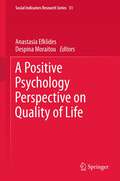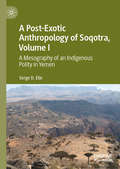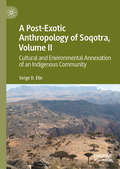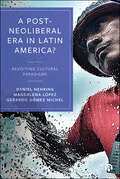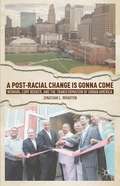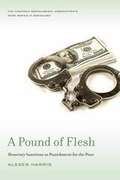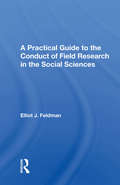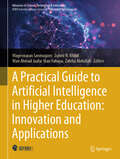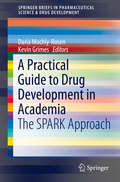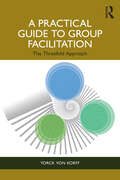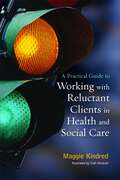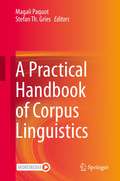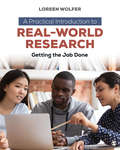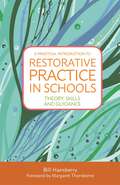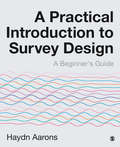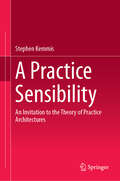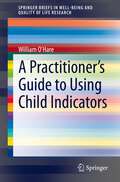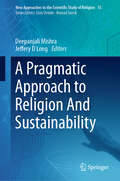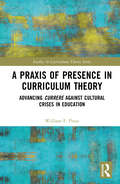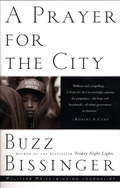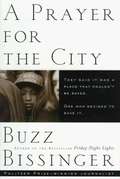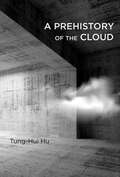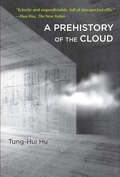- Table View
- List View
A Positive Psychology Perspective on Quality of Life (Social Indicators Research Series #51)
by Anastasia Efklides Despina MoraitouThe construct ''quality of life (QoL)'', since the 1980s, when it was introduced, is being used mainly in the context of health problems. Areas of one's life that contribute to QoL are good physical and mental health, efficient cognitive functioning, social support, being able to meet the requirements of professional life, positive emotions, etc (Power, 2003). Work on subjective well-being (SWB), on the other hand, was developed in the context of healthy everyday life; it also has a history of more than 30 years. During this 30-year period factors that have an impact on SWB, such as SES, gender, health, age, and religiosity have been identified (Diener, 2000). A third independent line of research pertains to what has been called Positive Psychology (Seligman & Csikszentmihalyi, 2000), that is, an emphasis on human strengths, such as optimism, hope, wisdom, positive emotions, resilience, etc., which contribute to positive functioning in life. Recently, SWB has been associated to human strengths and to the movement of positive psychology but this did not happen for QoL, possibly because of its emphasis on people with health problems. However, QoL can be conceived of as a generic term that pertains to all people, healthy or not. In this sense, it is closely related to SWB defined as happiness (Diener, 2000). Also, QoL encompasses positive emotions that go beyond happiness and has the advantage that it can be applied to many different domains of life such as interpersonal relations, health-related situations, and professional and educational strivings. Moreover, the mechanism(s) that underpin QoL and SWB can be studied in relation to people's goals and strengths of character, that is, from a positive psychological perspective. Such a perspective can reveal the specificities of "quality" in the various domains of life and, specifically, the positive emotions and strengths that contribute to a happier, healthier, and more successful life, even in face of adversity. Therefore, despite the differences among the three theoretical traditions, namely QoL, SWB, and positive psychology, it is possible to find the common ground they share and each of them can benefit from notions developed in the others. The aim of the present book is to bring together these three traditions, show the interactions of variables emphasized by them, and give an integrative perspective from the positive psychology point of view. It also aims to extend the range of life situations in which one can look for quality and which go beyond the traditional emphasis of QoL on health problems. Thus, the content of the proposed book covers different age populations (from children to older adults), healthy and people facing health problems as well as people facing problems in their interpersonal lives or in their pursuits. It also discusses factors that contribute to marital satisfaction, well being in the school context, and things that people value and cherish. The chapters refer to notions such as happiness, interest, resilience, wisdom, hope, altruism, optimism, and spirituality/religiosity that represent unique human strengths. Finally, it emphasizes the role of goals and motivation that connect SWB with self-regulation and managing of one's life priorities. To conclude, the chapters included in the proposed edited book aim at bringing to the fore new theoretical developments and research on QoL, SWB, and positive psychology that bridges previously distinct theoretical traditions. The proposed book covers a broad range of topics, addresses different theoretical interests and paves the way for a more integrative approach. Finally, it brings together an international set of authors, from USA, Europe, Australia, and Asia.
A Post-Exotic Anthropology of Soqotra, Volume I: A Mesography of an Indigenous Polity in Yemen
by Serge D. ElieThis two-volume book offers a panoramic explanatory narrative of Soqotra Island’s rediscovery based on the global significance of its endemic biodiversity. This rediscovery not only engendered Soqotra’s protective environmental supervision by United Nations agencies, but also the intensification of its bureaucratic incorporation and political subordination by Yemen’s mainland national government. Together, the two volumes provide a “total” community study based on an historically contextualized and analytically detailed portrait of the Soqotran community via a multi-layered narrative the author terms a “mesography.” The first volume, A Post-Exotic Anthropology of Soqotra, Volume I: A Mesography of an Indigenous Polity in Yemen, situates the author’s study within the emergent configuration of the structures of knowledge production in the social sciences before moving onto a systematic identification of the constitutive aspects, pivotal vectors, and historical contexts of Soqotra’s transitioning polity. The second volume, A Post-Exotic Anthropology of Soqotra, Volume II: Cultural and Environmental Annexation of an Indigenous Community, explores how cultural modernization in the light of environmental annexation transforms communal possibilities, development models, environmental values, conservation priorities, cultural practices, economic aspirations, language preferences, livelihood choices, and other key social norms. The two volumes lay the social scientific foundations for the study of Soqotrans as an island-based indigenous community.
A Post-Exotic Anthropology of Soqotra, Volume II: Cultural and Environmental Annexation of an Indigenous Community
by Serge D. ElieThis two-volume book offers a panoramic explanatory narrative of Soqotra Island’s rediscovery based on the global significance of its endemic biodiversity. The first volume, A Post-Exotic Anthropology of Soqotra: A Mesography of an Indigenous Polity in Yemen initiated the analytical inventory of the four key vectors of Soqotra’s transition process through a discussion of the first two: economic disarticulation and political incorporation. This volume, A Post-Exotic Anthropology of Soqotra: Cultural & Environmental Annexation of an Indigenous Community completes the analytical inventory by exploring the other two pivotal vectors of transition: cultural modernization and environmental annexation. These two vectors encompass the critical sociocultural spheres and environmental domains in which Soqotra’s transformation process is unfolding. The origin of these vectors is situated within Soqotra’s long history of exogenous mediations by external actors and their symbolic appropriation of the island into an imaginative geography. The legacy is a “symbolic curse," which has made Soqotra into an ideal playground for fantasist cultural or environmental experiments. Accordingly, this volume undertakes, first, a systematic inventory of the communal effects engendered within the domains of cultural modernization: dissonant linguistic attitudes, alienating consumption practices, divergent religious affiliations, and differentiating economic aspirations. Second, it anatomizes the process of environmental annexation through the reconstruction of the formulation and implementation process of a biodiversity conservation and sustainable development experiment in which the island and its residents are appropriated into an anachronistic paradigm – a pastoral ecotopia – as a blueprint of their future.
A Post-Neoliberal Era in Latin America?: Revisiting cultural paradigms
by Daniel Nehring, Magdalena López and Gerardo Gómez MichelAvailable Open Access under CC-BY-NC licence. Ongoing conflicts between neoliberal and post-neoliberal politics have resulted in growing social instability in Latin America. This book explores the cultural dynamics of neoliberalism and anti-neoliberal resistance in Latin America as a complex set of interrelated cultural forms, examining the ways in which neoliberalism has transformed public discourses of self and social relationships, popular cultures and modes of everyday experience. Contributors from an international range of different disciplinary perspectives look at how Latin Americans construct subjectivities, build communities and make meaning in their everyday lives in order to analyse the discourses and cultural practices through which a societal consensus for the pursuit of neoliberal politics may be established, defended and contested.
A Post-Racial Change Is Gonna Come
by Jonathan L. WhartonThis work offers a political and historical analysis of Newark's modern politics since 1950, culminating with Mayor Cory Booker's rise to power and prominence both in the city and in American political consciousness. Newark's recent political history offers an interesting case study in mayoral elections, community development, and coalition building politics. While Newark is the quintessential post-industrial city, Booker has received critical attention for his post-racial politics since he frequently bypasses racial and traditional urban politics. At the same time, relations between the mayor, the municipal council, and Newark's diverse communities were often so fractious that sustainable coalition building proved to be an elusive goal to resolve longstanding crime, education, and other social problems. Based on original interviews with Cory Booker, city council members, and other prominent Newark politicians, A Post Racial Change is Gonna Come is a powerful history of how Newark became the focal point for transformative politics in urban America.
A Pound of Flesh: Monetary Sanctions as Punishment for the Poor
by Alexes HarrisOver seven million Americans are either incarcerated, on probation, or on parole, with their criminal records often following them for life and affecting access to higher education, jobs, and housing. Court-ordered monetary sanctions that compel criminal defendants to pay fines, fees, surcharges, and restitution further inhibit their ability to reenter society. In A Pound of Flesh, sociologist Alexes Harris analyzes the rise of monetary sanctions in the criminal justice system and shows how they permanently penalize and marginalize the poor. She exposes the damaging effects of a little-understood component of criminal sentencing and shows how it further perpetuates racial and economic inequality. Harris draws from extensive sentencing data, legal documents, observations of court hearings, and interviews with defendants, judges, prosecutors, and other court officials. She documents how low-income defendants are affected by monetary sanctions, which include fees for public defenders and a variety of processing charges. Until these debts are paid in full, individuals remain under judicial supervision, subject to court summons, warrants, and jail stays. As a result of interest and surcharges that accumulate on unpaid financial penalties, these monetary sanctions often become insurmountable legal debts which many offenders carry for the remainder of their lives. Harris finds that such fiscal sentences, which are imposed disproportionately on low-income minorities, help create a permanent economic underclass and deepen social stratification. A Pound of Flesh delves into the court practices of five counties in Washington State to illustrate the ways in which subjective sentencing shapes the practice of monetary sanctions. Judges and court clerks hold a considerable degree of discretion in the sentencing and monitoring of monetary sanctions and rely on individual values—such as personal responsibility, meritocracy, and paternalism—to determine how much and when offenders should pay. Harris shows that monetary sanctions are imposed at different rates across jurisdictions, with little or no state government oversight. Local officials’ reliance on their own values and beliefs can also push offenders further into debt—for example, when judges charge defendants who lack the means to pay their fines with contempt of court and penalize them with additional fines or jail time. A Pound of Flesh provides a timely examination of how monetary sanctions permanently bind poor offenders to the judicial system. Harris concludes that in letting monetary sanctions go unchecked, we have created a two-tiered legal system that imposes additional burdens on already-marginalized groups.
A Practical Guide To The Conduct Of Field Research In The Social Sciences
by Elliot J. FeldmanThis book offers students in the social sciences simply stated, direct guidance in defining problems for research and in organizing and conducting a research program. Confronting philosophical and practical problems, it will serve both graduate and undergraduate students well, providing the former with assistance in preparing their theses and informing the latter on how to develop research papers. Dr. Feldman addresses basic questions about topic selection, interviewing, surveys, documentation, and other research methods. While his emphasis is on comparative research, any student pursuing field research in political science, sociology, anthropology, geography, social psychology, and other branches of the social sciences will find the book helpful. The concentration on data collection, rather than analysis, will make it particularly useful for those undertaking a research project for the first time.
A Practical Guide to Artificial Intelligence in Higher Education: Innovation and Applications (Advances in Science, Technology & Innovation)
by Mageswaran Sanmugam Zuheir N. Khlaif Wan Ahmad Jaafar Wan Yahaya Zaleha AbdullahThis book explains how educators can use artificial intelligence in education to enhance student engagement and improve learning outcomes by sharing best practices for using AI to enhance learning quality and foster sustainable teaching. This book covers various topics related to the use of AI in education, from designing activities to using AI in teaching to using AI in assessment by following the ethical considerations of using AI in teaching. The book not only discusses the related topics to using AI in education, but also presents best practices of using AI in teaching and learning from different countries and provides best practices of ethical considerations based on lives experiences of the authors. Furthermore, the book introduces the teaching methods of integrating AI in teaching and learning. Therefore, this book offers essential information and a practical guide to using AI in education.
A Practical Guide to Drug Development in Academia: The SPARK Approach (SpringerBriefs in Pharmaceutical Science & Drug Development)
by Daria Mochly-Rosen Kevin Grimes"A lot of hard-won knowledge is laid out here in a brief but informative way. Every topic is well referenced, with citations from both the primary literature and relevant resources from the internet. " Review from Nature Chemical Biology Written by the founders of the SPARK program at Stanford University, this book is a practical guide designed for professors, students and clinicians at academic research institutions who are interested in learning more about the drug development process and how to help their discoveries become the novel drugs of the future. Often many potentially transformative basic science discoveries are not pursued because they are deemed 'too early' to attract industry interest. There are simple, relatively cost-effective things that academic researchers can do to advance their findings to the point that they can be tested in the clinic or attract more industry interest. Each chapter broadly discusses an important topic in drug development, from preclinical work in assay design through clinical trial design, regulatory issues and marketing assessments. After the practical overview provided here, the reader is encouraged to consult more detailed texts on specific topics of interest. "I would actually welcome it if this book's intended audience were broadened even more. Younger scientists starting out in the drug industry would benefit from reading it and getting some early exposure to parts of the process that they'll eventually have to understand. Journalists covering the industry (especially the small startup companies) will find this book a good reality check for many an over-hopeful press release. Even advanced investors who might want to know what really happens in the labs will find information here that might otherwise be difficult to track down in such a concentrated form. "
A Practical Guide to Group Facilitation: The Threefold Approach
by Yorck von KorffA Practical Guide to Group Facilitation introduces a unique threefold approach to facilitation, blending Person-Centered Practice, system knowledge, and method expertise together. It serves as a comprehensive resource for facilitators seeking to enhance their professional skills.The book delves into the significance of Person-Centered Practice as the cornerstone of facilitation, exploring personal facilitator qualities like congruence, empathic listening, and unconditional positive regard, inspired by the principles of Carl Rogers. It successfully integrates Jane Loevinger's personal development theories with facilitator skill development, illustrating the symbiotic relationship between personal growth and effective facilitation. Additionally, the book incorporates Nonviolent Communication (NVC) into the facilitator's toolkit, offering practical strategies for navigating challenging situations. It covers a spectrum of facilitation methods, from structured approaches to the Person-Centered style of Carl Rogers, equipping facilitators to face diverse group contexts.Presenting valuable skills and insights to enhance professional practice, this book will be highly relevant reading for facilitators, mediators, and those offering training. It will also be useful reading for professionals in participatory processes such as coaches, team leaders, organizational leaders, managers, and mentors.
A Practical Guide to Working with Reluctant Clients in Health and Social Care
by Maggie KindredPractitioners in health and social care are often required to work with clients who do not want to work with them, and these 'reluctant' clients can often be the most challenging, but most rewarding, to work with. This practical, jargon-free book covers all the issues that practitioners are likely to encounter in the course of working with reluctant clients. The emphasis is on making theory easy to use, and the book is written in an easily digestible and lively style. Topics covered include staying safe, verbal and non-verbal communication, making initial contact with a client, crisis situations, recording, and how to end work with a client. Activities to work through are included at the end of each topic and illustrations feature throughout. This is an essential book for students, practitioners, voluntary sector workers and trainers in the fields of health, social care and social work.
A Practical Handbook of Corpus Linguistics
by Stefan Th. Gries Magali PaquotThis handbook is a comprehensive practical resource on corpus linguistics. It features a range of basic and advanced approaches, methods and techniques in corpus linguistics, from corpus compilation principles to quantitative data analyses. The Handbook is organized in six Parts. Parts I to III feature chapters that discuss key issues and the know-how related to various topics around corpus design, methods and corpus types. Parts IV-V aim to offer a user-friendly introduction to the quantitative analysis of corpus data: for each statistical technique discussed, chapters provide a practical guide with R and come with supplementary online material. Part VI focuses on how to write a corpus linguistic paper and how to meta-analyze corpus linguistic research. The volume can serve as a course book as well as for individual study. It will be an essential reading for students of corpus linguistics as well as experienced researchers who want to expand their knowledge of the field.
A Practical Introduction to Real-World Research: Getting the Job Done
by Loreen WolferThis practical text combines social research methods with coverage of statistical analysis to help students develop the applied research skills needed for future careers in public and private organizations, while also delivering a solid foundation for those going on to graduate school. Throughout the book, the author offers a real-world example and then breaks it down into a decision tree, which helps lead students to a possible statistical decision (rather than starting with the statistic). This text gives students a toolbox of the most common and in-demand skills and demonstrates how those skills can be used to make the best research decisions. The book takes students through the entire real-world research process, from the formation of a research topic to measurement and sampling, to methods for gathering information and making sense of the data, and finally presenting to a non-academic audience in a way that "gets the job done."
A Practical Introduction to Real-World Research: Getting the Job Done
by Loreen WolferThis practical text combines social research methods with coverage of statistical analysis to help students develop the applied research skills needed for future careers in public and private organizations, while also delivering a solid foundation for those going on to graduate school. Throughout the book, the author offers a real-world example and then breaks it down into a decision tree, which helps lead students to a possible statistical decision (rather than starting with the statistic). This text gives students a toolbox of the most common and in-demand skills and demonstrates how those skills can be used to make the best research decisions. The book takes students through the entire real-world research process, from the formation of a research topic to measurement and sampling, to methods for gathering information and making sense of the data, and finally presenting to a non-academic audience in a way that "gets the job done."
A Practical Introduction to Restorative Practice in Schools: Theory, Skills and Guidance
by Margaret Thorsborne Bill HansberryProven to reduce bad behaviour and exclusions, and encourage happier, safer school environments, restorative justice is an effective approach to conflict resolution. Suitable for education settings from preschool to college, this guide explains what restorative justice is, how it can be used in schools, what it looks like in the classroom and how it can be implemented. Featuring case studies that illuminate the underlying restorative principles and practices, this book covers a wide range of topics from the basics of restorative justice, through to school-wide processes for embedding the approach in policy and practice. Drawing on the expertise of educators and consultants, this is a must-have resource for any school or centre that is serious about reducing bad behaviour and developing safer learning communities.
A Practical Introduction to Survey Design: A Beginner′s Guide
by Haydn AaronsThis is your definitive guide to designing your social survey. It includes all the knowledge and skills you need to plan your survey with confidence and ease. Every step of survey design from developing your questions, to administering your survey and preparing your data for analysis, is explained in easy to follow language. It features: Case studies demonstrating how effective surveys are conducted in real life Clear advice on how to design an ethical social survey Practical exercises to help you construct your survey Suggestions for further reading taken from cutting edge, multidisciplinary sources The book also comes with a host of useful online resources, including templates and reflective questions, to help strengthen your understanding and apply your new found knowledge.
A Practical Introduction to Survey Design: A Beginner′s Guide
by Haydn AaronsThis is your definitive guide to designing your social survey. It includes all the knowledge and skills you need to plan your survey with confidence and ease. Every step of survey design from developing your questions, to administering your survey and preparing your data for analysis, is explained in easy to follow language. It features: Case studies demonstrating how effective surveys are conducted in real life Clear advice on how to design an ethical social survey Practical exercises to help you construct your survey Suggestions for further reading taken from cutting edge, multidisciplinary sources The book also comes with a host of useful online resources, including templates and reflective questions, to help strengthen your understanding and apply your new found knowledge.
A Practice Sensibility: An Invitation to the Theory of Practice Architectures
by Stephen KemmisThis book introduces readers to the theory of practice architectures and conveys a way of approaching practice theory through developing a practice sensibility. It shows that, in order to change our practices, we must also change the conditions that make those practices possible. The book draws on everyday life to illustrate how we can see the world by watching it unfold in practices: it argues that life happens in practices. The theory of practice architectures takes the ontological nature of practices seriously by recognising that practices take place in the real world. Consequently, the book offers a new perspective on how practices happen amidst a vast world of happenings; on how we participate in the “happening-ness” of the world through our practices. It invites us to consider whether our practices reproduce or aggravate the contemporary environmental crises confronting the Earth, and whether we can transform our current practices to ameliorate these crises. Given its focus and scope, the book will benefit master’s and doctoral students in social and educational theory, early career researchers, and established researchers new to practice theory.
A Practitioner’s Guide to Using Child Indicators (SpringerBriefs in Well-Being and Quality of Life Research)
by William O'HareThis book focuses on projects using child indicators outside of a research context and provides a user-friendly set of materials to help professionals or organizations start and sustain high-quality child indicator projects. The book is based on the fundamental idea that better data leads to better decisions regarding programs for children. The number of people with experience and expertise in developing child indicator projects is limited in many countries. This initiative provides critical information on the topic in a cost-effective manner, and thereby fills an important niche regarding the use of child indicators. To the extent that it promotes more and better child indicator projects, the book leads to more attention for children and better decision-making regarding public support for children. It is also likely to increase the number of such projects that exist and to improve the quality of such projects. This easy-to-use and practical guide is for all professionals and organizations working with child indicators data.
A Pragmatic Approach to Religion And Sustainability (New Approaches to the Scientific Study of Religion #15)
by Deepanjali Mishra Jeffery D LongThis volume outlines various religious practices followed across the global south and highlights their correlation to sustainability. It features more than 30 chapters from scholars across diverse disciplines, including philosophy, economics, ethics, theology, sociology, ritual studies, and education. The interdisciplinary volume mines religious rituals and practices for answers that could aid and alleviate unsustainable lifestyles. Delving deep into the cultural practices of tribal religions in India, the book highlights humanistic elements to establish sustainable ways of thinking, feeling, acting, and being. Including perspectives from Buddhism, Judaism, Hinduism, Christianity, and tribal religious traditions, this book is a must for scholars interested in sustainability and religion in the global south.
A Praxis of Presence in Curriculum Theory: Advancing Currere against Cultural Crises in Education (Studies in Curriculum Theory Series)
by William F. PinarBuilding on his seminal methodological contribution to the field – currere – here William F. Pinar posits a praxis of presence as a unique form of individual engagement against current cultural crises in education. Bringing together a series of updated essays, articles, and new writings to form this comprehensive volume, Pinar first demonstrates how a praxis of presence furthers the study of curriculum as lived experience to overcome self-enclosure, restart lived and historical time, and understand technology through a process of regression, progression, analysis, and synthesis. Pinar then further illustrates how this practice can inform curricular responses to countering presentism, narcissism, and techno-utopianism in educators’ work with "digital natives." Ultimately, this book offers researchers, scholars, and teacher educators in the fields of curriculum theory, the sociology of education, and educational policy more broadly the analytical and methodological tools by which to advance their understanding of currere, and in doing so, allows them to tackle the main cultural issues that educators face today.
A Prayer for the City
by Buzz BissingerFrom the Pulitzer Prize-winning author of Friday Night Lights, the heart-wrenching and hilarious true story of an American city on its knees and a man who will do anything to save it.A Prayer for the City is acclaimed journalist Buzz Bissinger's true epic of Philadelphia mayor Ed Rendell, an utterly unique, unorthodox, and idiosyncratic leader willing to go to any length for the sake of his city: take unions head on, personally lobby President Clinton to save 10,000 defense jobs, or wrestle Smiley the Pig on Hot Dog Day—all the while bearing in mind the eternal fickleness of constituents whose favor may hinge on a missed garbage pick-up or an overzealous meter maid. It is also the story of citizens in crisis: a woman fighting ceaselessly to give her great-grandchildren a better life, a father of six who may lose his job at the Navy Shipyard, and a policy analyst whose experiences as a crime victim tempt her to abandon her job and ideals. "Fascinating, humane" (The New Yorker) and alive with detail and insight, A Prayer for the City describes the rare combination of political courage and optimism that may be the only hope for America's urban centers.
A Prayer for the City: The True Story of a Mayor and Five Heroes in a Race Against Time
by Buzz BissingerA Prayer for the City is Pulitzer Prize-winning journalist Buzz Bissinger's true epic of Philadelphia mayor Ed Rendell, an utterly unique, unorthodox, and idiosyncratic leader who will do anything to save his city: take unions head on, personally lobby President Clinton to save 10,000 defense jobs, or wrestle Smiley the Pig on Hot Dog Day--all the while bearing in mind the eternal fickleness of constituents whose favor may hinge on a missed garbage pick-up or an overzealous meter maid. It is also the story of citizens in crisis: a woman fighting ceaselessly to give her great-grandchildren a better life, a father of six who may lose his job at the Navy Shipyard, and a policy analyst whose experiences as a crime victim tempt her to abandon her job and ideals. Heart-wrenching and hilarious, alive with detail and insight, A Prayer for the City describes a city on its knees and the rare combination of political courage and optimism that may be the only hope for America's urban centers.
A Prehistory of the Cloud
by Tung-Hui HuWe may imagine the digital cloud as placeless, mute, ethereal, and unmediated. Yet the reality of the cloud is embodied in thousands of massive data centers, any one of which can use as much electricity as a midsized town. Even all these data centers are only one small part of the cloud. Behind that cloud-shaped icon on our screens is a whole universe of technologies and cultural norms, all working to keep us from noticing their existence. In this book, Tung-Hui Hu examines the gap between the real and the virtual in our understanding of the cloud. Hu shows that the cloud grew out of such older networks as railroad tracks, sewer lines, and television circuits. He describes key moments in the prehistory of the cloud, from the game "Spacewar" as exemplar of time-sharing computers to Cold War bunkers that were later reused as data centers. Countering the popular perception of a new "cloudlike" political power that is dispersed and immaterial, Hu argues that the cloud grafts digital technologies onto older ways of exerting power over a population. But because we invest the cloud with cultural fantasies about security and participation, we fail to recognize its militarized origins and ideology. Moving between the materiality of the technology itself and its cultural rhetoric, Hu's account offers a set of new tools for rethinking the contemporary digital environment.
A Prehistory of the Cloud (The\mit Press Ser.)
by Tung-Hui HuThe militarized legacy of the digital cloud: how the cloud grew out of older network technologies and politics.We may imagine the digital cloud as placeless, mute, ethereal, and unmediated. Yet the reality of the cloud is embodied in thousands of massive data centers, any one of which can use as much electricity as a midsized town. Even all these data centers are only one small part of the cloud. Behind that cloud-shaped icon on our screens is a whole universe of technologies and cultural norms, all working to keep us from noticing their existence. In this book, Tung-Hui Hu examines the gap between the real and the virtual in our understanding of the cloud. Hu shows that the cloud grew out of such older networks as railroad tracks, sewer lines, and television circuits. He describes key moments in the prehistory of the cloud, from the game “Spacewar” as exemplar of time-sharing computers to Cold War bunkers that were later reused as data centers. Countering the popular perception of a new “cloudlike” political power that is dispersed and immaterial, Hu argues that the cloud grafts digital technologies onto older ways of exerting power over a population. But because we invest the cloud with cultural fantasies about security and participation, we fail to recognize its militarized origins and ideology. Moving between the materiality of the technology itself and its cultural rhetoric, Hu's account offers a set of new tools for rethinking the contemporary digital environment.
